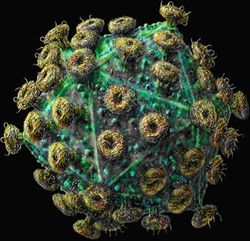
 Stem cells transformed into HIV killers:
Stem cells transformed into HIV killers:
In this current study, the researchers similarly engineered human blood stem cells and found that they can form mature T cells that can attack HIV in tissues where the virus resides and replicates. They did so by using a surrogate model, the humanized mouse, in which HIV infection closely resembles the disease and its progression in humans.
In a series of tests on the mice's peripheral blood, plasma and organs conducted two weeks and six weeks after introducing the engineered cells, the researchers found that the number of CD4 "helper" T cells — which become depleted as a result of HIV infection — increased, while levels of HIV in the blood decreased. CD4 cells are white blood cells that are an important component of the immune system, helping to fight off infections. These results indicated that the engineered cells were capable of developing and migrating to the organs to fight infection there.

 A huge and hugely interesting New Yorker article about myth-making and the Titanic.
A huge and hugely interesting New Yorker article about myth-making and the Titanic.
 Kim Jong-un makes first speech to North Korean people; boasts of military supremacy.
Kim Jong-un makes first speech to North Korean people; boasts of military supremacy.
 Illinois legislators unlikely to pursue marriage equality in 2012.
Illinois legislators unlikely to pursue marriage equality in 2012.
 Chaz and a cast of thousands celebrate Pride in Miami.
Chaz and a cast of thousands celebrate Pride in Miami.
 Laurel Snyder dares to ask: Do I get to be religious if I give up my religion?
Laurel Snyder dares to ask: Do I get to be religious if I give up my religion?
 Peterson Toscano's long journey from reparative therapy — and Zambia.
Peterson Toscano's long journey from reparative therapy — and Zambia.
 Couples who cohabitate before marriage are more likely to get divorced (and apparently, it's not just because non-cohabitators are hyper-traditionalist:
Couples who cohabitate before marriage are more likely to get divorced (and apparently, it's not just because non-cohabitators are hyper-traditionalist:
In a nationwide survey conducted in 2001 by the National Marriage Project, then at Rutgers and now at the University of Virginia, nearly half of 20-somethings agreed with the statement, “You would only marry someone if he or she agreed to live together with you first, so that you could find out whether you really get along.” About two-thirds said they believed that moving in together before marriage was a good way to avoid divorce.
But that belief is contradicted by experience. Couples who cohabit before marriage (and especially before an engagement or an otherwise clear commitment) tend to be less satisfied with their marriages — and more likely to divorce — than couples who do not. These negative outcomes are called the cohabitation effect.
 CNN on Southernness:
CNN on Southernness:
… Davis, a native of Butler, Georgia (population 2,000), observes the word "Southern" has come to be associated with opposition to the American norm. He teaches Southern studies, so students often ask him, "What is Northern studies?"
"'Northern studies' is American studies. 'Southern' is the opposition to that," he says.

 The Times on left-handedness:
The Times on left-handedness:
only a handful of facts about hand preference warrant the epithet “well-established.” Left-handers do have an edge in one-on-one sports like tennis, boxing and baseball, and left-handedness clearly tends to become less pronounced with age. We also know that twins are roughly twice as likely to be left-handed as singletons and that men are slightly more likely to be left-handed than women. Beyond that, most “common knowledge” about left-handedness consists of myths — myths that, curiously, even left-handers themselves believe in, like the notion that left-handers always smear their writing. Solid research has shown that the writing of left-handers in third grade is indistinguishable from that of right-handers, in both speed and quality.
 The loneliness of the Facebook friend:
The loneliness of the Facebook friend:
Despite its immense popularity, or more likely because of it, Facebook has, from the beginning, been under something of a cloud of suspicion. The depiction of Mark Zuckerberg, in The Social Network, as a bastard with symptoms of Asperger's syndrome, was nonsense. But it felt true. It felt true to Facebook, if not to Zuckerberg. The film's most indelible scene, the one that may well have earned it an Oscar, was the final, silent shot of an anomic Zuckerberg sending out a friend request to his ex-girlfriend, then waiting and clicking and waiting and clicking—a moment of superconnected loneliness preserved in amber. We have all been in that scene: transfixed by the glare of a screen, hungering for response.



